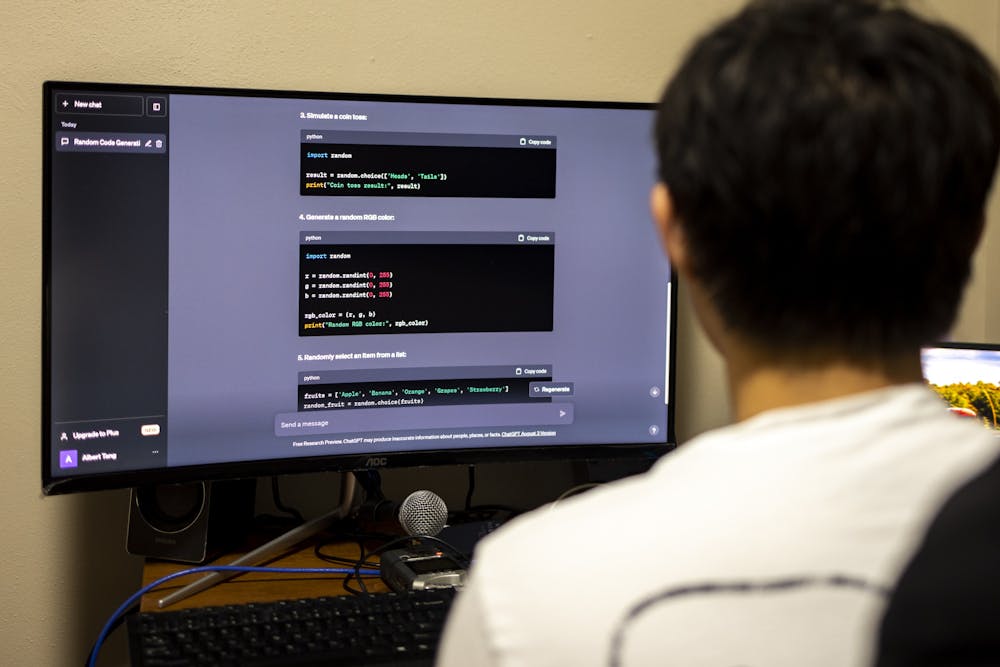Computer science faculty at the University have begun taking steps to set a precedent on the use of generative Artificial Intelligence in the classroom as its popularity with students continues to grow. While perspectives on its use vary, faculty appear to be open-minded about their students using AI.
Faculty in the Computer Science department of the School of Engineering attended a retreat in August where they discussed generative AI in the classroom. Briana Morrison, associate professor of computer science, served as the facilitator for the retreat and said that most professors felt 50-50 about the student use of AI except during examinations.
“The 50 percent mark really said, if [students] want to use it on the open-ended assignment, [professors] don’t have any problems with that,” said Morrison. “Just don’t use it on exams or quizzes.”
In March, the University formed the GENAI Task Force to tackle the implications generative AI poses to academic integrity. Generative AI — like ChatGPT, a popular platform that can respond to nearly any question asked of it — is artificial intelligence software that produces outputs from a given input. The task force has since provided guidelines surrounding the technology’s use in the classroom, including that a professor’s policy on AI must explicitly be in their syllabus.
Some faculty have already barred use of generative AI in quizzes and exams. In Morrison’s classes, students are allowed to use AI but are required to include citations — Raymond Petitit, associate professor of computer science, also includes this limitation in his syllabi.
Third-year college student Clara Xin said the use of generative AI has proved useful in her computer science studies. Xin primarily uses programs like ChatGPT as a troubleshooting mechanism.
“ChatGPT will help you figure out what's wrong with your code — it’s honestly a lot easier than trying to figure it out myself,” stated Xin.
Xin said she views generative AI as a tool students can use as a starting point to help give them ideas. The greatest benefit of AI for students, Xin said, lies in its ability to explain concepts in an understandable way.
The application of AI in courses, however, differs from course to course. One of Morrison’s coding-intensive classes — Data Structures and Algorithms 1 — is fundamental to building the skills a programmer needs, and Morrison said she prefers students rely primarily on their own knowledge.
“If [students] are going to rely on generative AI to give [them] the bulk of [their] answers, they are not going to understand the material well enough to be able to succeed in following classes or in technical interviews,” Morrison said.
Elizabeth Orrico, a lecturer in the department who teaches Discrete Mathematics, said that while her view may not be representative of her colleagues, she is supportive of AI use in the classroom as a tool to assist students.
“Why would I not let you use a tool that is always going to be there for you?” Oricco said. “You have to learn how something works before you can apply it … we do have to learn how to add and subtract by ourselves before we start using a calculator.”
Asst. Computer Science Prof. Will McBurney, who is currently teaching Software Development Essentials, said that more unstructured problems helps him feel more confident in the use of AI in classrooms. The concern for some CS professors is students using AI to short-circuit the learning process or stifle creativity.
“I do want students to see these tools and get experienced with these tools,” McBurney said.”But I don't want that to come at the expense of actually learning the foundational knowledge, like figuring out when the tool is wrong.”
Orrico said that for now, AI can only go so far in the classroom, especially when it comes to design and creative thinking in computer science.
“The human is still very much the creator and the original thinker,” Orrico said. “Creative and original thought — AI is not very good at it yet, or in the foreseeable future.”
For students and professors still curious about using AI in the classroom, the GENAI Task Force offers resources online.







